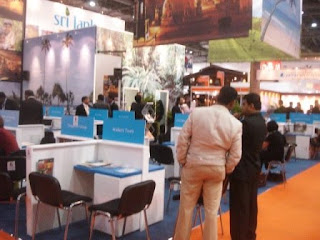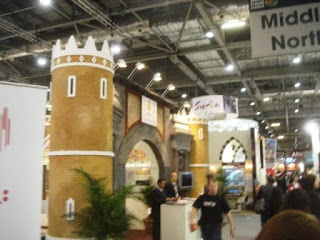That is, until I went to 15 diplomatic receptions. In three days.
No, really.
See, the Philippines was a candidate to be on the council of a large, important London-based multilateral group I'll call "IMHO" (actually, that's not too far from the group's real name, if said in a kapangpangan accent ), and faced stiff competition from 25 other countries. The campaigning was hard, frenzied and, yes, involved a LOT of receptions and cocktail shrimp. Here's what I remember of it:
** To sit on the council of IMHO is a pretty big deal, so it was no surprise that many candidate countries brought in dozens of additional top gun diplomats, officials and personalities from their capitals. The Philippines, on the other hand, only had a handful of people - most of whom were already from the Embassy - who brought with them nothing but the merits of their country, the smiles on their faces, and a song in their hearts.
** The big campaign to-do for most countries was the hosting of a diplomatic reception to get the word out on their candidacy and to publicly seek the support of the other nations in attendance. Again, the Philippines passed on holding a similar large-scale event for this election, and instead relied on a scrappy, grassroots person-to-person campaign (and if you think I wasn't totally OK with this strategy because it would give me a chance to pretend I was part of an "insignificant band of rebels" going up against the mighty Empire and hum the Star Wars theme as I entered every reception -- then you just don't know me that well)
** Speaking of pretend, you might be wondering if going inside another country's embassy for a reception is a little like a James Bond/Mission Impossible movie. The answer is no, it is not; it is A LOT like a James Bond/Mission Impossible movie! Ok, there were no guard dogs patrolling the lawns (most embassies in London don't even have lawns; expensive real estate and all that), and you don't first enter the grounds in a scuba wetsuit that you unzip to reveal a barong inside (are you kidding? malulukot!). But just like in the movies, embassy interiors and ambience are very intriguing, reception guestlists are compelling, and conversations are martini-aided. I honestly wanted to accidentally get lost in one of the embassies just so some official could purposefully approach me and ask, "looking for something?", whereupon I could suavely reply, "the bathroom".
** There are rituals on the National Geographic channel that are less interesting and elaborate than the scene at many of the campaign receptions. First of all, up to 10 countries a day hold a reception, which means you can't stay for more than 30 minutes before moving on to the next one; this severely limits the length and nature of the conversations that you can have, not to mention the amount of cocktail shrimp you can consume. Secondly, after you've said your quick hellos and goodbyes at one reception, you criss-cross London only to discover that the guests at the next receptions. . .are almost entirely the same people you were talking to at the earlier ones (which leads to a slew of "so, we meet again...Indonesia" and "we should have carpooled" jokes). Third, after just engaging in sparkling conversation with someone high-ranking from another country, you'll see some people turn their backs to the room, surreptitiously take a piece of paper from their coat pockets, and proceed to scratch off a name from a list -- this is still a campaign, after all.
** There's also an art and a skill to exchanging calling cards at a reception that I have yet to master. For one thing, I often forget to bring enough with me, which means if I meet someone and he manages to give me his card, he's basically just yelled "Tag! You're it!" to everyone else in the room. For another, even when I do have cards with me, I still clumsily fumble through my pockets getting to them, and my handover is usually less than smooth (I mean, where do I put down my plate of cocktail shrimp?). The veteran diplomats, on the other hand, efficiently card everyone in a room like ninjas throwing star knives.
** Looking back, I kind of wonder about the cost-effectiveness of holding a big reception. Yes, it's high-profile and high-impact, but it also seems to attract the people who were going to support the host anyway. At the same time, receptions allow guests to solicit votes from the other guests that were conveniently gathered for them (all while the host pays for the cocktail shrimp!). Likewise, receptions give other countries a good idea of the host's existing level of voter support - or lack thereof. See, while some receptions were roaring successes, with guests packing the embassy well into the night, other receptions were decidedly. . .not. As in you-can-hear-crickets-in-the-background not. I mean, thanks for inviting us over and we may very well vote for you, but in the meantime...aawwkkwwaaaaaaarrdd.
** Anyway, every country also has to intensively campaign at the retail, country-by-country level: personal calls are made, substantive meetings are held, notes and other diplomatic correspondence are sent out by home offices and embassies all over the world, QPQs are proposed/accepted. Then everything comes to a head the week of the IMHO election, as each candidate tries to keep track of those countries that have already expressed support and those that are still up for grabs. All the candidates now have to locate the Head of Delegation of the still-undecided countries during the IMHO assembly and personally solicit their support -- a not-too-easy task since there are more than 160 nations in IMHO, many with large visiting delegations. Since the delegation heads are often from the outside and unknown to everyone else, an amusing scene ensues at the IMHO: swarms of candidate country officials (including me) spread out all over the place eyeballing country nameplates, ID cards and flagpins in the hope of positively identifying a head of delegation. If you suspect, but aren't sure, that someone is your assignment, you follow him/her all around until he/she stops and you can get close enough to talk to them and confirm their identity. How is this different from stalking, you ask? Other than we all have diplomatic immunity if caught, not much. Not much at all.
** I cannot emphasize enough the comedic possibilities of the whole track-down-and-chat-up-someone-who's-identity-you're-not-sure-of process. The following, for instance, are three absolutely true stories from the field, in ascending order of hilarity:
1) a diplomat starts a conversation with a person who the diplomat thinks is the head of a delegation; the diplomat is actually talking to...the delegation's driver.
2) a diplomat starts a conversation with a person who the diplomat thinks is the head of a delegation; the diplomat is actually talking to...a member of hotel security.
3) a guy diplomat starts talking to a girl on the sidewalk right outside the IMHO building; the guy diplomat is actually talking to...a member of the IMHO secretariat, who rushes back into the IMHO building because she thinks she is being picked up by the guy diplomat.
And yet, here I sit for hours - in a clearly marked chair - and no one approaches me. Sigh.
** As a final reminder to everyone else of their candidacy, many countries leave token gifts and souvenirs (notepads, paperweights, keychains etc) on all the other countries' desks. Once again, however, the Philippines manages to come away ahead. While all the other countries package their tokens inside a plastic gift box or bag (like the kind you buy at stationary shops), the Philippines gives away a big, foldable earth-friendly-cloth shopping bag. This results in one of two things: a) people who find the gift boxes/bags of other countries too unwieldy to bring to receptions leave those behind, but always still bring the Philippines' bag with them because it neatly folds away; or b) people unfold the Philippine bag and place all the other countries' gifts inside that bag. Either way, guess which country's name always ends up being seen by everyone?
Hint: rhymes with "Philippines"
Once the vote results come in, team Philippines finds success. Major success. Make no mistake, this is big, and will serve vital national interests well. I was just glad to play a small part in it, and to see all the master Philippine diplomats up close and in action. And for all its significance and importance, the whole thing was also quite fun.
Hey, they could even make an SNL skit about it someday.









































































